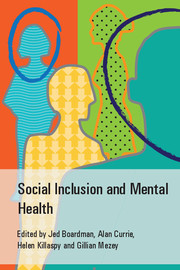Book contents
- Frontmatter
- Contents
- List of contributors
- List of tables, boxes and figures
- Foreword
- Preface
- Acknowledgements
- Scoping Group on Social Inclusion, Royal College of Psychiatrists
- Part 1 What is social exclusion?
- 1 Introduction
- 2 Concepts of social exclusion
- 3 Social exclusion of people with mental health problems and learning disabilities: key aspects
- 4 Policy and social exclusion
- 5 How is social exclusion relevant to psychiatry?
- 6 Socially inclusive working across the psychiatric subspecialties
- Part 2 Social exclusion: the scope of the problem
- Part 3 Working towards inclusive psychiatry
- Index
6 - Socially inclusive working across the psychiatric subspecialties
from Part 1 - What is social exclusion?
Published online by Cambridge University Press: 01 January 2018
- Frontmatter
- Contents
- List of contributors
- List of tables, boxes and figures
- Foreword
- Preface
- Acknowledgements
- Scoping Group on Social Inclusion, Royal College of Psychiatrists
- Part 1 What is social exclusion?
- 1 Introduction
- 2 Concepts of social exclusion
- 3 Social exclusion of people with mental health problems and learning disabilities: key aspects
- 4 Policy and social exclusion
- 5 How is social exclusion relevant to psychiatry?
- 6 Socially inclusive working across the psychiatric subspecialties
- Part 2 Social exclusion: the scope of the problem
- Part 3 Working towards inclusive psychiatry
- Index
Summary
In Chapter 5 we made the general case for why psychiatry should be concerned about social exclusion and the need to pay attention to its drivers and effects. In this chapter we will take the main subspecialties and examine in what way social exclusion is relevant to them and what social exclusion and inclusion may mean to their practice. For our discussion we have chosen psychiatric subspecialties represented by the Faculties of the Royal College of Psychiatrists (with the exception of the general and community psychiatry, discussed in Chapter 5): Rehabilitation and Social Psychiatry, Forensic Psychiatry, Liaison Psychiatry, Psychotherapy, Child and Adolescent Psychiatry, Psychiatry of Old Age, Addictions Psychiatry and Psychiatry of Learning Disability.
Rehabilitation and social psychiatry
Since rehabilitation services focus on individuals with the most complex needs and greatest levels of functional impairment, by definition they also work with one of the most socially excluded groups of mental health service users. In addition, large numbers of service users with high support needs are placed in community residential and nursing homes that are a long way from their local area of origin and family, thus further exacerbating their social dislocation.
Two key areas underpin much of the focus of contemporary rehabilitation services: promotion of community living and engagement in meaningful occupation. The benefits of these have been well evidenced through national and international studies and are, in short, related to the promotion of recovery, the avoidance or minimisation of institutionalisation and the promotion of social inclusion.
Markers of recovery
Rehabilitation services increasingly adopt a recovery orientation and use ‘markers of recovery’ to assess outcomes that have a great deal of overlap with aspects of social inclusion. These include having access to mainstream leisure, education and work, self-management of finances, positive family relationships, an enjoyable social life, and civic integration including taking part in local mainstream community groups and voting (Liberman & Kopelowicz, 2002). The specific interventions of rehabilitative psychiatry promote service users’ mental health and their skills and confidence in managing everyday activities, and gradually facilitate them to hold increasing responsibility for their self-management. As this process progresses, more complex activities and a fuller daytime structure develop, leading ultimately to mainstream community participation.
- Type
- Chapter
- Information
- Social Inclusion and Mental Health , pp. 86 - 98Publisher: Royal College of PsychiatristsPrint publication year: 2010

